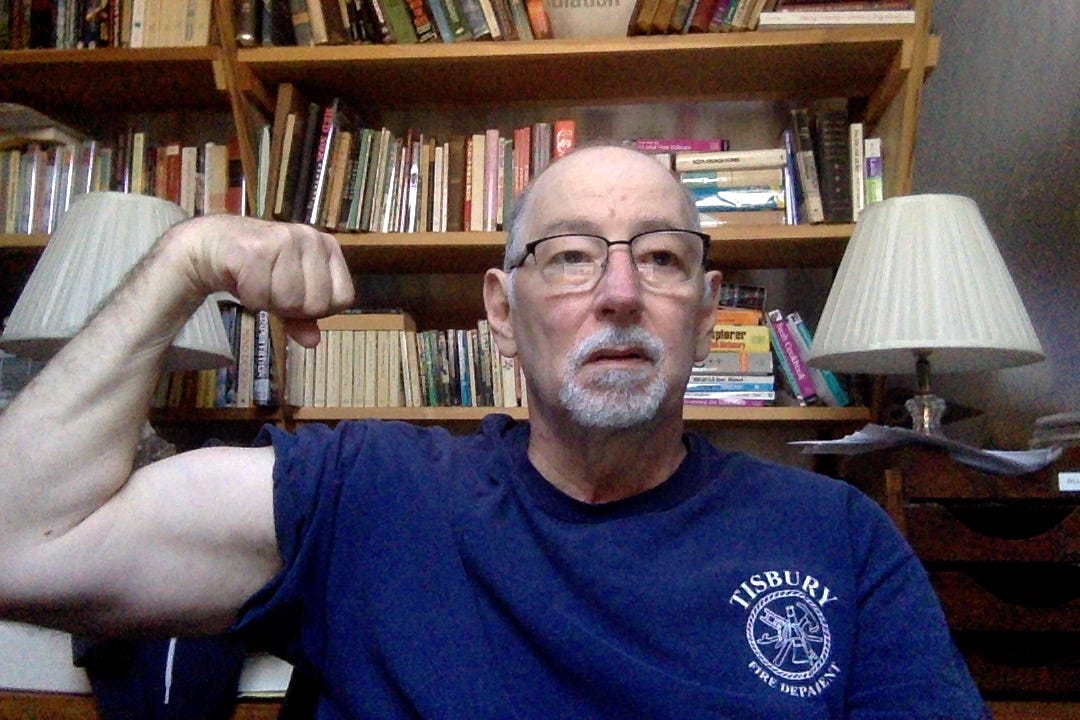Welcome and Précis
Sundman figures it out! is an ongoing autobiographical meditation. Incidents, themes, preoccupations and hobbyhorses arise, fade, reappear and ramify. So the more of these essays you read, the more enjoyment you’re likely to get out of subsequent ones.
I sometimes go back and make small edits to the first version of posts that go out to subscribers as emails. I do this to correct typos, add a clarification or links to other related essays. But I try to keep the original post mostly intact.
This post offers little story about the time a fellow who, by way of introducing himself to me, announced his intention to end my life, and how I foiled that attempt. With sundry digressions onto topics including cosmic coincidences, mortality, “Chewbacca conversations,” YAFS (“yet another failed startup”), a visit to a former fiancée, training with free weights at the firehouse vs with resistance bands at Gymnasium Pandemica, a lukewarm book review that had great effect, and further explorations of the ancient art of weaving.
“I’m going to kill you, $undesirable_person”
I have resided on Martha’s Vineyard, an island south of Cape Cod, MA, since September, 1994. From time to time I have had jobs that required me to find a place to live away from home, whether in the Boston area or NYC.
In May, 2000, I was renting a room from ‘Suzy,’ a colleague at Curl, Inc, a well-funded startup in Kendall Square, Cambridge, adjacent to the campus of MIT. Suzy owned a lovely house on Melville Street, Dorchester, in a neighborhood near a boundary between ‘lovely historic Boston’ and ‘a part of town you probably don’t want to walk in after dark.’ Suzy worked in IT and I was the newly-hired manager of a 4-person technical documentation team. I had known her for about 5 minutes when I agreed to rent the room from her, sight unseen. During the few weeks from the start of my employment until then I had been commuting in from a friend’s house in Gardner, 60 miles to the west.
I was working late that night. I got on the Red Line train at Kendall/MIT and disembarked at Shawmut. As a precaution against pickpockets I had placed my wallet in the left front pocket of my trousers.
Part of my walk from the station to Suzy’s house took me down a fifty-yard-long dark alley that ran over the subway below. Well, it wasn’t completely dark, but it was dark enough.
I was the first person off the train. I walked up the stairs to the exit, then briskly down the alley. I hadn’t gone far when a man stepped out of the shadows. He was wearing one of those ‘cammo’ pattern hooded sweatshirts and he brandished a large hunting knife in his right hand. He said,
“I’m going to kill you, [$bad_word]; I’m going to kill you and take all your money.”
I started to reply to the effect that I was willing to surrender all my money, but the guy seemed pretty intent on the first part of his announced plan so our short conversation pretty much stopped there (although it did have one amusing continuance a bit later).

Fucked Company
Starting sometime in early 2000, as the dot-com bust was at peak stride, a website called Fucked Company sprang up, where people could trade rumors about companies doomed to imminent implosion. Fucked Company was full of resigned, worried, often funny posts from people working inside those companies. Posts of the general form “We’re so fucked, I wonder if I’ll have a job next week, or if the company will even exist.”
For you youngsters, the dot-com bust was kind of like today’s crypto winter. Speaking of crypto, I had a job as a technical writer for a cryptocurrency startup from September 2020 through August, 2021. Boy, am I ever glad I got out of that gig. It was giving me nightmares and palpitations. I’ll have to tell you about that sometime
Curl was spun out of project in the computer science department at MIT. The idea was to invent a new programming model and language for the internet. Background: when the Internet came into existence thanks to the widespread acceptance of the TCP/IP protocol and the elaboration of the client/server programming paradigm, programs were based on a cobbled together hodgepodge of languages and software technologies such as HTML, Javascript, Java, CSS, browsers, plugins and so forth. It was one giant ad-hoc mess that required programmers to learn a half-dozen programming languages before they could write a client/server ‘hello world’ application. It was hard to program, hard to use, wasteful of resources, and rife with security holes. It was never really designed, it just grew. It was a textbook kludge.
But what if, asked the genius poindexters at MIT, what if we started from scratch and we did design a safe, secure, efficient, easy to program, easy to use Internet? Wouldn’t that be grand? OK we’ll keep TCP/IP, said they, but everything else goes in the dumpster! Who needs that crap! We’re going to replace it all with with our grand unified programming language/environment, “Curl”! We’ll write the client in Curl! We’ll write the server in Curl! We’ll write the Curl compiler in Curl! The internet will be so much easier to program, to keep secure, to run, to use! Not only that, but we’ll own it! Every person on earth will pay us! We’ll make more money than Calvin Coolidge. Put together!”
It was a ridiculous proposition from the get-go. It was as if they had come up with this thing called ‘the metric system’ which they would license to America to replace its stupid and inefficient kludge of inches and feet, pints and gallons, yards and miles. Once everybody heard about millimeters and centimeters, meters and kilometers, milliliters and liters, not to mention degrees centigrade, they would run to embrace this marvelous new system! And pay good money for the privilege, too! Well, good luck with that, kids.
But they started yet another startup, and investors gave them fifty million dollars, some of which they gave to me to grow and run their documentation group. Which was nice considering that in the years just prior I had been broke and virtually homeless on Martha’s Vineyard, legendary playground of the idle rich.
I spent two years watching Curl’s stupendously incompetent senior management piss away that fifty million dollars, and commuting home to the Vineyard on weekends to see my family. I hired a dozen very skilled people to develop Curl’s documentation, became friends with every one of them, then laid them all off, one by one, before getting the axe myself. The first year at Curl was OK, I met many fine people and played with a lot of cool technology. But the second year was hellish as the reality sank in that Curl hadn’t the faintest idea how to make any money with their groovy new software.
But at least, at the end, it was amusing to read the anonymous posts about Curl on Fucked Company that described in excruciating detail just how fucked we were, and to try to figure out who had written each one.
A dinner party in N’Darr
N’Darr, also known as St. Louis, is a small city with an Old New Orleans look that sits at the mouth of the Senegal river. In 1975 there were about six Peace Corps Volunteers living there and teaching in the high school (of which there was only one at that time). Most PCVs in Senegal were teachers in high schools, but I was an animateur, living in Fanye Dieri, a small village three hours upriver working on agricultural, famine relief, and development projects. There were a handful of us animateurs in the region, and we all had keys to an apartment in N’Darr where we could crash if we had reason to be in the city.
One of my projects was helping the people of my home village of Fanaye Dieri to build a school. I secured funding from the US Embassy in Dakar, ordered construction materials including cement, rebar, and tin roofing from a supplier in N’Darr, and arranged to have it delivered. The owner of the building supply company was, like many merchants in Senegal, from a Lebanese family.

I don’t remember how it came about, but one Sunday I ended up having dinner at the home of the mother of that businessman, in a simple but charming apartment in the center of Old St. Louis. Also at that dinner were two other animateurs, Frank and Howie, and our hostess’s other son, Assad, who was a teacher in the high school.
Assad later married Ellie, a Peace Corps Volunteer who was also a teacher at the high school, but I don’t think Ellie was at the dinner that day.
I get sliced
The fellow who had just announced his intention to kill me approached rapidly, evidently intending to make good on his promise. He swung his right hand with great force in my direction, and as he did I grabbed his right wrist with my left hand. He managed to slice my left forearm in a few places, but the problem with his plan was that I was considerably stronger than he was.
His face came quite close to mine and I couldn’t help observing that his front teeth were all kinds of crooked. I wondered if perhaps he needed money to pay his orthodontist but I thought that might be too impertinent a question to ask him at that time.

Slashdotted and a phone call from Writer’s Digest
I had been at my new job for only a short while — I was still sharing an office with three of the four people whose boss I was — when one of those people, Gary, said, “Hey John, check out Slashdot.” This is what I saw:
A glowing front page review on Slashdot. Can’t get much more geek cred than that. glowing Hemos gave the book 8 out of 10 stars, and said he described it to friends as “What Tom Clancy would write if he were smart.”
At the time the sales ranking of my self-published novel Acts of the Apostles was about one million. The next day it was 56, and for the weekend my ranking was higher than Tom Clancy’s and Michael Crichton’s. Such was the clout of Slashdot in those days.
And then a few weeks later I got a phone call from Jane Friedman, an editor at Writer’s Digest magazine. She told me that Acts of the Apostles had won that year’s National Self-Published Book Award.
As a consequence of these things some other things happened. Among them being that I began to get opportunities to sell my books at conferences where hackers and geeks converged.
Reunion in Fitchburg
I’ve already written about how I came home from Africa for the first time in 1976 a physical and emotional wreck. One of several reasons that I was in an emotional state was that my fiancée Anne had broken off our engagement. “I’m going to go play with Jane,” she said.
Then I went to Purdue to study agricultural economics and met Betty and we got married and had some kids and moved to Gardner, MA and then one day for reasons I won’t go into right now, when our daughter Jainaba (who was named for a little girl I had known in Fanaye), Betty and I decided to check out the Applewild School in Fitchburg, ten miles distant, and the person who gave us the tour asked about Jainaba’s name and I told her the story and she said, “Oh, Senegal? You should meet our French teacher. His name is Assad. He’s from Senegal. He met his wife Ellie when she was a Peace Corps Volunteer there.”
An so Assad became Jainaba’s French teacher and few years later Betty and I were at Ellie and Assad’s house for dinner. Their two sons were around ten and twelve years old. Parents and children all spoke to each other in both French and English. I asked Assad if he spoke to his mother in Arabic.
“No, I never learned Arabic.”
“Did you speak to her in French?”
“No, my mother never learned French.”
"Well, what language did you use to talk to your mother?"His answer surprised me but in retrospect it was obvious. This whole topic reminds me of Chewbacca conversations when parties speak to each other in different languages. Also the matter of ‘mother tongues,’ and of mother-child conversations in whatever language, which I shall have to write about at some future time.
A peculiar question and the scariest part of the encounter
I was grappling with the guy who was trying to rob and kill me when he said, “What are you waiting for?” I thought that was a peculiar question indeed, but as it turned out, he was not addressing me, but his co-assailant, who now approached me from behind. I only saw this second person’s arms and hands, which were small. So I don’t know if they were a woman or a child. It was upsetting that I was now dealing with two people attempting to rob and kill me. As the person behind me put their hand in my left front pocket I thought for one terrifying moment that I was about to be castrated.
But they were only looking for my wallet, which, to my great relief, they removed expeditiously, and then departed. Then I somehow threw the primary assailant to the ground and he got up and ran away.
Benching the Bar
When I came home from Africa the second time, in 1978, I went to the gym at Purdue and discovered that I was too weak to bench-press an empty bar. An empty bar weighs 45 pounds. I was twenty six years old. Everybody in the gym looked at me. I was embarrassed. I began to take an interest in lifting weights and building muscle. I became a gym rat.
Even after I retired from firefighting at age 65 I used to work out at the firehouse weight room in the loft that overlooks the apparatus bay.
Then Covid came and they closed the gym so I built Gymnasium Pandemica in my back yard. It has a heavy punching bag, a TRX set and a lot of resistance bands. Last year I added battle ropes. It’s really cool looking and you can get a no kidding, go to hell workout there and I’m proud of it. Someday I’ll give you a guided tour. But not today.
I never got really strong when I was younger, but I guess I got strong enough. I could bench my weight. My weight plus another 30 pounds on a good day. This is what I look like today. I’m 70.

When I got jumped I was about 50 and a lot more muscular. So that’s why I was able to deal with that guy who called me that bad name.
Perhaps if I had not been so embarrassed by not being able to bench press an empty bar I wouldn’t have become a gym rat and wouldn’t have been strong enough to fight off that punk with the crooked teeth. Then my wife would be a widow and I never would have written Cheap Complex Devices or The Pains or Biodigital and you wouldn’t be reading this. Things weave together. You should read my books.
By the way, the language that Assad used to communicate with his mother was Wolof.
A question of jurisdiction
After my attackers fled I went back to the subway station. There was a pay phone right outside the entrance. I wanted to call the police but I didn’t have any money for the phone. I finally persuaded the person working in the booth selling subway passes to lend me a quarter. They were quite unmoved by my tale of having been mugged by two assailants, but eventually they got sick of listening to me and passed me the coin.
I reached the 911 dispatcher, who proceeded to ask me a series of annoying questions about exactly where I was when I was attacked.
Me: I was by that alley that goes up toward Melville Avenue. Dispatch: Were you in the alley, or next to the alley? Me: What the fuck? I don't know. I was a bit busy, you know.
Seems that this was important to the dispatcher, because they had to decide whether to send the Boston City Police or the Boston Transit Police.
I just got jumped and stabbed. I’m bleeding and I got robbed of my wallet. Will you just fucking figure it out and send somebody, please?
So they did that. A police car came with two cops. They asked me if I wanted to go to the hospital but I said I was OK. Then they said, ‘Well do you want to drive around for a bit? Maybe we’ll see them.” and I said “fuck yeah I do.” But of course, my assailants were long gone.
The curious case of the colors on the bridge surfaces again
I haven’t yet told you the story about my visit to my former fiancee Anne, whom I hadn’t seen in eighteen years. She lived in Tucson and I stayed with her for a few days when I was on vacation from Curl and selling books at an O’Reilly Emerging Technology conference.
The day before I was to travel, my boss told me that I was going to have to choose four people to lay off two days later.
Me: But I'm going to be on vacation. I've sent books ahead. If I don't sell those books in Tucson I'm out a couple thousand dollars. Boss: Well, do the layoffs by telephone. Me: Goddammit if I have to tell a person that they don't have a job anymore I'm going to tell them to their face, not over the fucking telephone. I want Curl to fly me back here for a day so I can tell them in person. Boss: That's ridiculous. OK I'll do it.
It was a pretty intense four days. I made two round trips to Tucson by way of Phoenix. I’ll tell you the rest of that whole story sometime. Or maybe just part of that whole story. Or maybe I’ll just keep it all to myself. We’ll see.
A while ago I told you the philosophically challenging tale of colors manifesting themselves to me in three different ways on a bridge in Highland Park, New Jersey, in the summer of 1976. The question was asked, what are we to make of these curiously repeating incidents? How are we to understand time and coincidence?
On the night that I got mugged, Suzy, my landlady was out of town. A day or two later, after going into work, I went home for the weekend. When I returned to Cambridge, Suzy and I exchanged stories about what we had been up to during the preceding few days. I had been getting mugged and then going to work and then figuring out how to get some money now that I didn’t have any cash or my wallet or bank cards and then meeting with detectives from the Boston Transit Police and then going home to tell my wife all about how I almost got killed.
Suzy had been in central Massachusetts, visiting her cousin, who was also her best friend. Her cousin’s name was Ellie. She lived in Fitchburg with her husband Assad, a Lebanese-Senagalais guy she had met when she was in the Peace Corps in Senegal twenty five years earlier.
If you liked this essay you might also like The dark side of the hut, 50 years later, in which I describe a remarkable encounter I had when I was living in the small village of Fanaye Dieri, in Senegal, during a time of famine, pestilence and drought. Jerrycans full of gasoline in the back seat, tells the impossibly melodramatic story of how I first arrived in Senegal; What's the frequency, Tom?, describes my disorienting return to the States from Fanaye after nearly two years there and my equally disorienting first trip, of an eventual one hundred and twenty, to Silicon Valley. Entanglement, describes, among other things, my return to the Senegal River Valley to do research for a master's thesis in agricultural economics two years after I had said goodbye to Fanaye. And When the heavens opened over Fanaye tells of things I saw and did there, profound experiences that resonate with me still.






You do such a good job of interweaving your narratives. I am not a writer of fiction, just a curious lover of literature. No secrets will be disclosed. How do you decide what the right point is? You have fantastic things that happen to you, so your Senegalese friend must keep reappearing, and Suzy is an important connector. Are you going for what was a’ surprise effect when you were stronger than your mugger, or again when the little guy only wanted your wallet?
I think I am always too busy making a point to write fiction well or autobiography. I do enjoy wordplay. And make jokes all the time. And I like sarcasm—can’t help it. But neither of those things translate into prose.
Just love your writing!
Ak ab baax bés ci yow, Mr. Sundman! Ab géniale tale, for war damay ne tales?